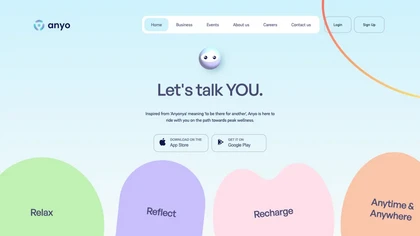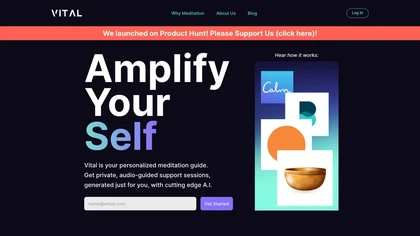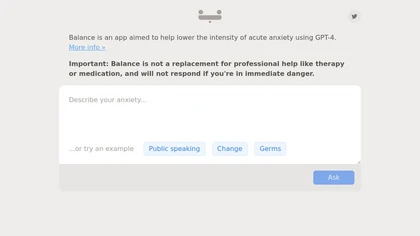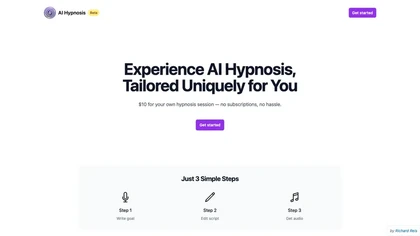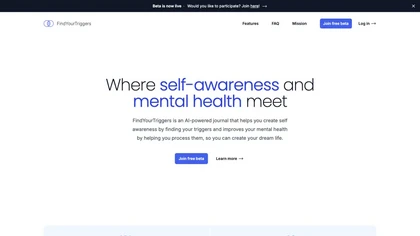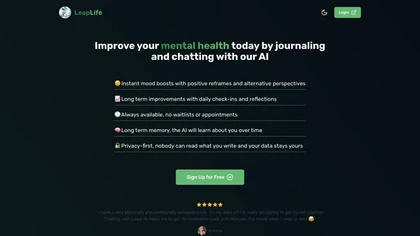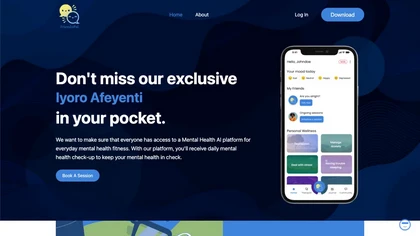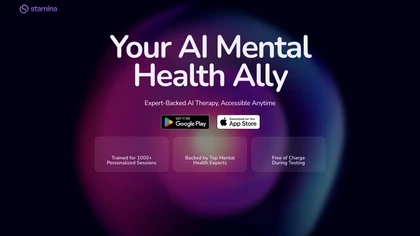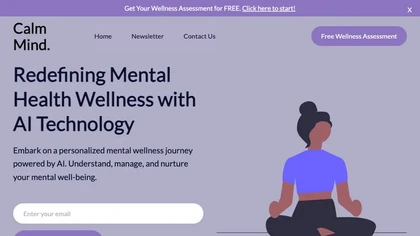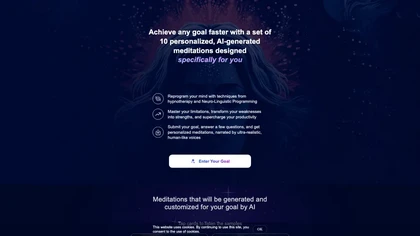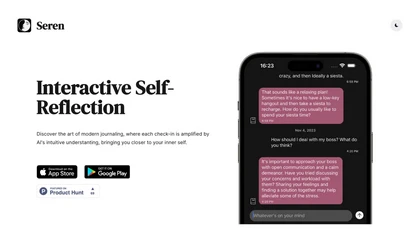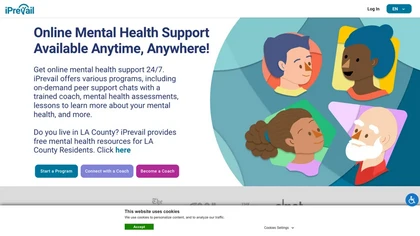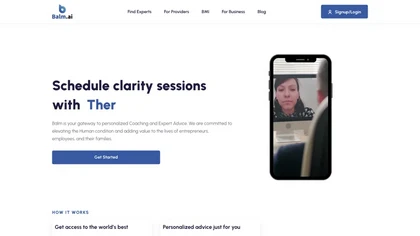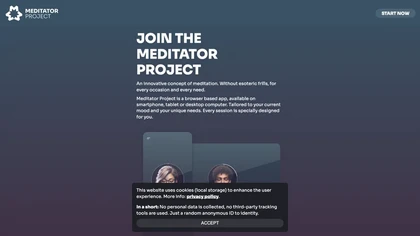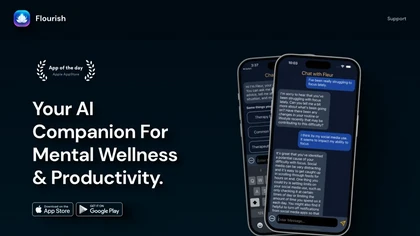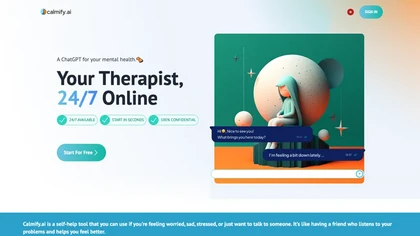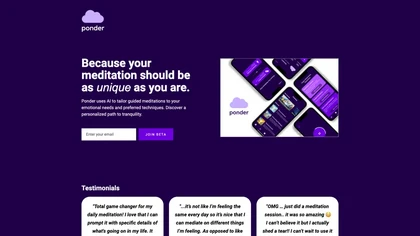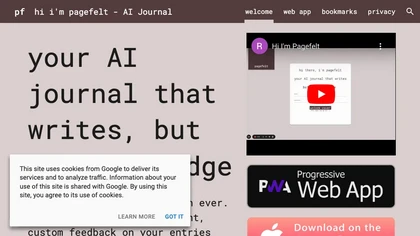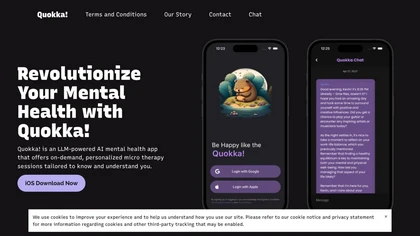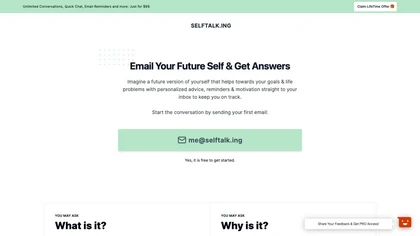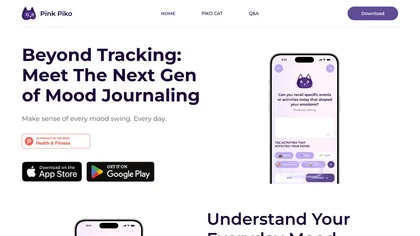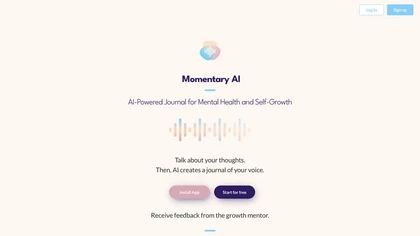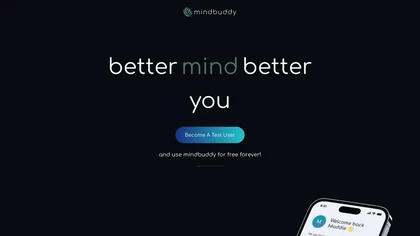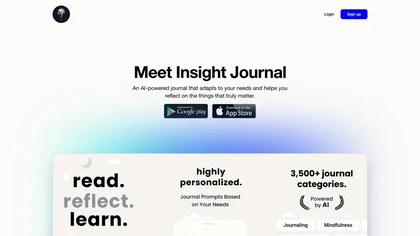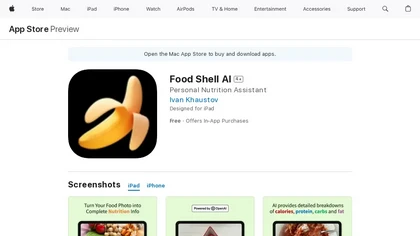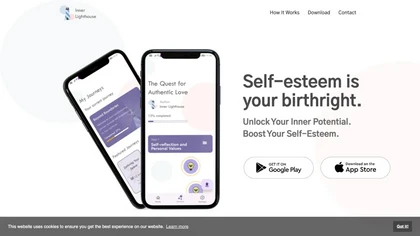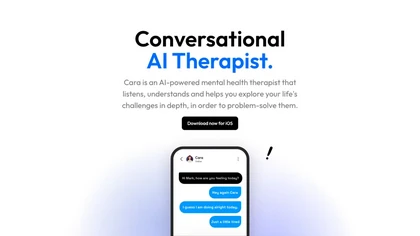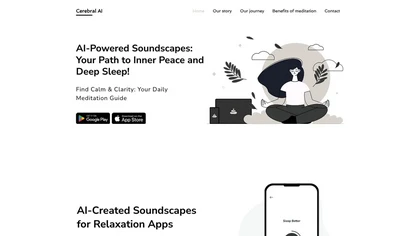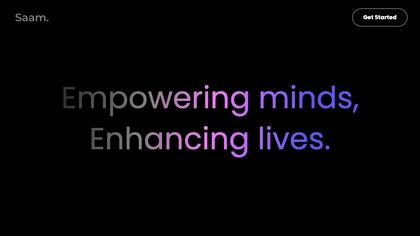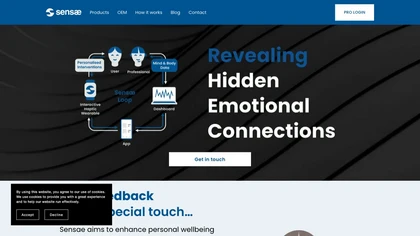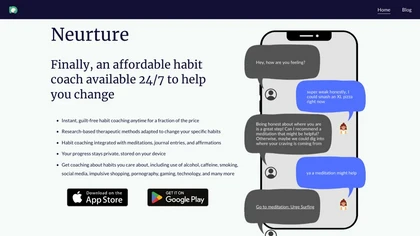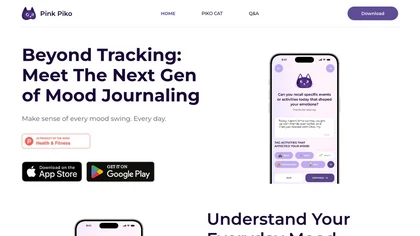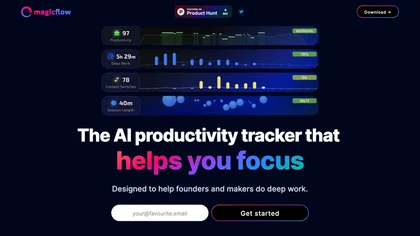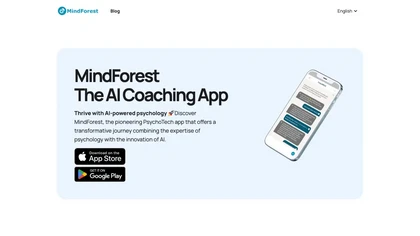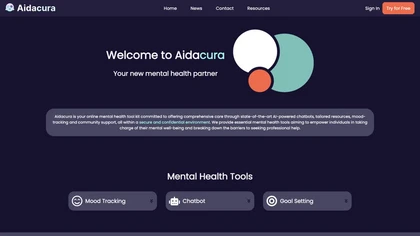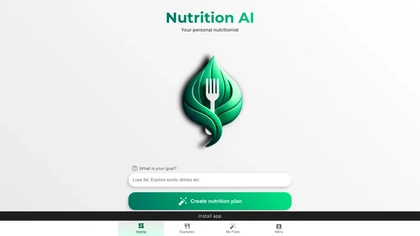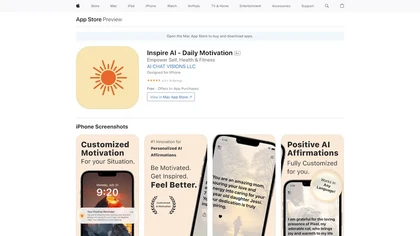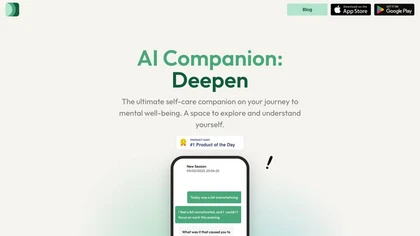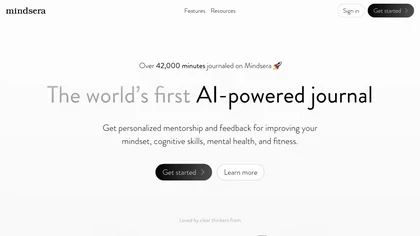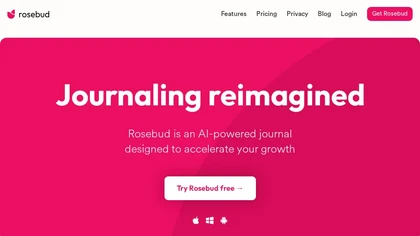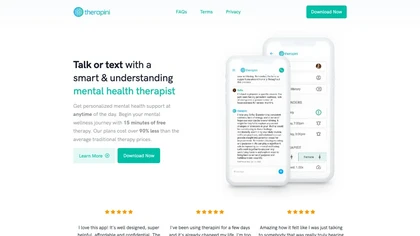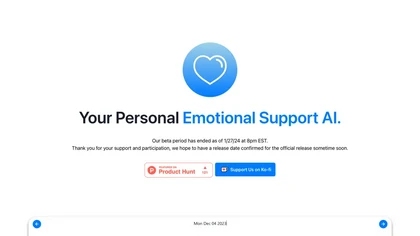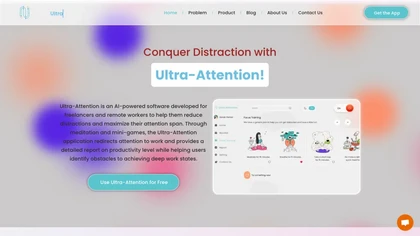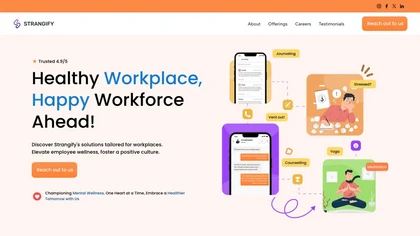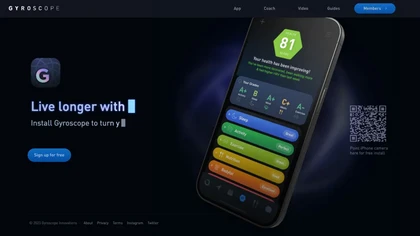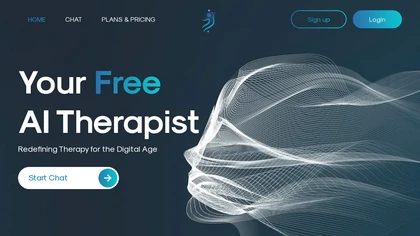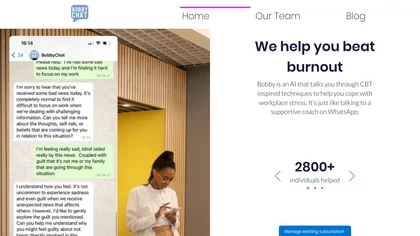AI use cases for Stress management
Generative AI can be applied in various applications for stress management. Here are some examples to explore below for inspiration with AI tools to get you started with using AI in stress management.
🛠️ 70 AI tools for Stress management
Explore a dynamic list of some of the most popular tools to get you started with various AI use cases and applications for Stress management to streamline your workflows and productivity today.
Anyo features
- Personalized self-care activities
- Resilience building through Carebox
- Real-time connections with listeners
- Seamless booking of therapist appointments
- High-quality content in yoga, psychology, meditation
Vital features
- Personalized audio-guided sessions
- Selection of eight specific meditation techniques
- Six different AI meditation coaches
- Automated email guidance
- Community building through practice comparisons and point system
Balance features
- Provides immediate support for individuals with anxiety
- Challenges anxious thoughts
- Assists in reducing the intensity of anxious thoughts
- Offers features to address specific anxieties such as public speaking or germ phobia
- Uses gpt-4 to provide assistance
Well Me Right features
- AI matching and Health Coach capabilities
- Personalized coaching
- Dietary tracking, nutritional guidance
- Guided meditation sessions
- Adaptive health partner
AI Hypnosis App features
- Customized hypnosis sessions tailored to individual goals
- Ability to input goals and edit scripts for personalized audio files
- Utilizes OpenAI Elevenlabs for audio generation
- Secure transactions through leading financial service Stripe
- No subscriptions, just a one-time payment for tailored sessions
Clearmind features
- To-Do lists
- Mood cards
- Meditation scripts
- Chat
FindYourTriggers features
- AI-powered journal
- Generates prompts based on user input
- Tracks user moods
- Identifies and processes behavior triggers
- Supports a structured three-step plan of assessment, planning, and implementing
🔥
Create your account, save tools & get personal recommendations
Receive a weekly digest of our handpicked top tools.
Unsubscribe anytime
LeapLife features
- AI chat function
- Personalized chatting AI
- Daily journaling
- AI therapists chat
- End-to-end encryption
BodyGuru features
- Personalized wellness routines generation
- Tailored recommendations
- Free platform
- Upcoming features integration
- Developed by JBBAE
Space of mind features
- Affordable PTSD support
- Facilitated peer support
- Anonymous therapist help
- Licensed therapist-guided sessions
- Range of support spaces
FriendnPal features
- virtual one-on-one chats with therapists
- supports various African languages
- booking therapy sessions online
- ASMR sounds for relaxation and stress relief
- digital journal for mood tracking
Stamina AI features
- Expert-backed AI therapy tool
- Over 1000 personalized sessions
- Cognitive behavioral therapy techniques
- 24/7 availability
- Personalized support from a team of 200+ mental health professionals
Mood AI by Mindset features
- Daily check-ins
- Daily reflections
- Expert advice
- Daily quotes
CalmMind features
- Wellness assessment
- Calmmind chat
- Curated wellness programs
- Therabot
- Community support
MoodPen features
- Real-time reflection
- Personal growth tracking
- Automated journal reflections
- Personalized feedback and suggested actionable steps
- Multi-lingual support
AtFirst features
- Affirmations
- Relaxation sessions
- Self-help guides
- Community feature
- Guided sleep affirmations
Pneuma features
- Augmented reality integration
- Personalized meditation sessions
- State-of-the-art technology
- Intuitive interface
- Guided breathing exercises
6000 thoughts features
- Organize thoughts
- Clarify thinking
- Identify biases
- Achieve breakthroughs
- Self-reflection
Neomind features
- Personalized meditations generated by AI
- Utilizes hypnotherapy and neuro-linguistic programming techniques
- Customization based on user's specific goal and needs
- Narrated by ultra-realistic, human-like voices
- Accompanied by a 53-page workbook with science-backed exercises and NLP techniques
Seren features
- AI-powered interactive self-reflection journaling tool
- AI chat functionalities for insightful feedback and guidance
- Delve deeper into emotions and thoughts
- Secure and private space for self-discovery
- Encrypted conversations and focus on privacy
iprevail.com features
- Personalized wellness programs
- User-friendly interface
- Self-help modules
- Therapy sessions
- AI algorithms for progress tracking
Balm.ai features
- Personalized coaching
- Access to top experts
- 1-on-1 virtual sessions
- Tailored advice
- Convenient expert connection
Meditator.pro features
- Browser-based app
- Available on smartphones, tablets, and desktops
- AI-guided meditation tool
- Choose between two AI coaches
- Specially designed meditation sessions
Flourish features
- Meaningful Conversations
- Psychology-based Mental Health Assessments
- Stress Relief Tools
- Productivity Tools
- Quality Mental Health Support
calmify.ai features
- AI-powered mental health companion
- 24/7 online support
- Personalized and empathetic assistance
- Employing evidence-based cognitive behavioral therapy (CBT) strategies
- Uses state-of-the-art large language models (LLMs)
MindwellAI features
- Self-care
- Coping tools
- Journal writing
- Coaching
- Anxiety management program
Ponder features
- Tailoring guided meditations to emotional needs
- Personalizing meditations based on current emotions and situation
- Offering flexible meditation options
- Providing structured courses for meditation
- Adapting to support the user's self-discovery and growth journey
Pagefelt features
- Web app
- Journal daily
- Instant custom feedback
- Ai-generated bookmarks
- Improve mental health
Quokka! features
- Personalized micro therapy sessions
- 24/7 access to affordable AI-powered therapists
- Truly personalized chat experience with a GPT-4-powered AI therapist
- Exploring deep dive features for gaining insights and advice on specific mental health topics
- Using HRV data from biometrics like the Apple Watch to interpret mood changes over time
Solid Apps features
- Voting Board functionality
- Feature suggestion
- Sorting by Trend, Top, and Newest
- Filtering by Category and Status
- Integration with Apple Health
Selftalk.ing
4.9Selftalk.ing features
- Unlimited conversations with future self
- Quick chat interface
- Email reminders
- Personalized advice and motivation
- Access to past conversations
AMARI features
- AI mental health coach
- Accessible through WhatsApp
- Personalized advice
- 24/7 support through text
- Stress management
Pink Piko features
- Interactive tracking experience
- Insightful questions for emotional reflection
- AI-powered technology for interpreting mood logs
- Personalized emotional insights
- Transforms emotional data into tangible insights
Momentary features
- AI-powered journaling experience
- Voice-activated journaling
- AI-powered transcribing
- Mood categorization
- Supportive AI mentor
mindbuddy app features
- Specially trained chatbot 'buddy'
- Specialization in cognitive behavioral therapy (CBT)
- Personalized guidance through AI
- Track mood and access past chat sessions
- Continuous learning and adaptation capabilities
Alter features
- Genetic trait analysis
- Personalized fitness plans
- Stress monitoring
- Nutrition guidance based on DNA
- Access to top-tier coaches and wellness advisor
Insight Journal features
- AI-powered
- Intuitive interface
- Organize thoughts
- Track progress
- Privacy and security
Food Shell AI features
- nutrition information analysis based meal photos
- calories tracking
- personalized recommendations
- photo food logging
- OpenAI GPT-vision technology
Inner Lighthouse features
- Structured approach towards self-esteem improvement
- Variety of expertly curated journeys
- Daily 10-minute cognitive exercise sessions led by professional psychologists
- Privacy and security measures
- Integration into daily routine for well-being enhancement
Cara features
- Conversational AI therapist
- Powered by GPT
- Natural responses and advice
- Insightful and non-judgmental guidance
- Available on iOS
Gala Coach features
- Personalized profile creation
- Daily support and motivation
- Smart tracking features
- Tailored guidance
- Interactive nutrition lessons
Cerebral Ai features
- AI-powered meditation app
- Variety of soundscapes for inner peace and deep sleep
- Daily guided meditations using AI-created calming soundscapes
- Tailored mindfulness recommendations
- Enhancing relaxation and mindfulness through synthetic voices and calming sounds
Drsaam features
- Journaling
- Friend integration
- Confidentiality
- Privacy
- Security
FoodZilla.io features
- Recipe builder
- Meal planning system
- Nutrition reports
- Mobile app
- Secure messaging
Sensae Loop features
- AI-driven analytics
- Haptic biofeedback
- Physiological and emotional state monitoring
- Stress assessment
- Modular and customizable solutions
Neurture features
- Affordable habit coaching
- 24/7 availability
- Utilizes research-based therapeutic methods
- Integrated with meditations, journal entries, and affirmations
- Allows digitization of handwritten journal entries
PinkPiko features
- Mood tracking
- Interactive experience
- Insightful questions
- Personalized emotional insights
- Actionable insights
Mynd features
- Key themes
- Emotions
- Patterns
Magicflow.com features
- Live flow timers
- Focus sessions
- Pomodoro timers
- Distraction warnings
- Glowing flow meter
MindForest features
- AI-powered psychology for personal growth
- Insight Journal feature for automatic journaling
- Tailored insights and exercises based on psychological principles
- Psychometrics assessments for understanding personality facets
- Integration of psychology expertise with AI innovation
GetZingAI features
- Personalized habit management tool
- Curated challenges and programs
- Reflection feature for journaling
- Integration with productivity tools
- Community and accountability features
Aidacura features
- AI-powered chatbots
- Tailored resources
- Mood-tracking
- Community support
- Natural language processing
NutritionAI features
- Customized nutrition plans creation
- Tailored meal plans examples
- Focus on privacy and user control
- Installation at home
- Platform login feature for support and queries
Insightful features
- Provide personalized on-demand coaching
- Focus on specific needs
- Available anytime, anywhere
- Blog with latest insights on living a fulfilling life
- Accountability coaching to help young professionals reach full potential
InspireAI features
- Personalized affirmations
- Motivations for health, fitness, and mindset
- Endless supply of positive mindset quotes
- Smart suggestions
AI Eczema App features
- Track and monitor eczema triggers through images
- Manage personalized treatment plans
- Analyze correlations between triggers and severity
- Provide visual graphs to track eczema trends over time
- Offer eczema severity scoring and real-time weather alerts
Deepen features
- Chat sessions with AI companion
- Guided conversations
- Insights dashboard
- Supports exploration and understanding of emotions
- Aids in decision-making
Mindsera features
- Mentor model
- Mindset analysis
- Automatic summaries
- Habit tracking
- Dark mode
Rosebud Journal features
- Analyzing thoughts
- Organizing into themes and topics
- Extracting insights
- Uncovering patterns
- Auto-tagging entries
therapini features
- Personalized support and guidance
- Navigation of common therapy FAQs
- Confidential mental wellness assistance
- Communication via talk or text
- Practical and encouraging tailored advice
Dr. FeelGood features
- Personal AI motivational coach
- Human-like understanding
- Powerful motivational capabilities
- Available 24/7
- Coaching sessions anytime needed
Lily features
- Voice-activated AI
- Personalized guidance for mental health
- Support for anxiety, stress, self-esteem
- Digital wellness guide
- Privacy and tailored support
Reassurance AI (Beta) features
- Interactive chatbot named Sai for guidance and advice
- Personal journal for logging thoughts and self-reflection
- Customization options for fonts, sizes, and speech voices
- Tracking of interactions with Sai and journal entries
- Subscription for updates on future releases and features
Nutrition Assistant features
- dietary advice support
- intolerance support
- recipe suggestions
- nutritional goal assistance
- personalized nutrition guidance
Ultra-Attention features
- Meditation mini-games
- Detailed productivity reports
- Machine learning for detecting working habits
- Tracking eye, mouse movements, and facial expressions
- Limiting unnecessary or distracting applications
Lotus features
- AI therapist functionality
- Cognitive behavior therapy (CBT)
- Virtual therapist interaction
Strangify features
- Real-time crisis intervention
- Professional counseling sessions
- Supportive community of listeners and licensed counselors
- Anonymous connection for users to express thoughts and feelings
- Access to resources for mindfulness practices like yoga and meditation
Gyroscope features
- Personalized guidance
- Video guides
- Tracking tools
- Insights through reports
- Custom workouts
Therapy with AI
4.9Therapy with AI features
- personalized therapy
- learns from conversations
- provides guidance
- effective coping strategies
- privacy and confidentiality
Bobby Chat features
- AI-powered wellness companion
- Chat-based interface
- Resources for self-improvement
- Empowerment focus on women in the workplace
- Tools for developing healthy coping mechanisms
